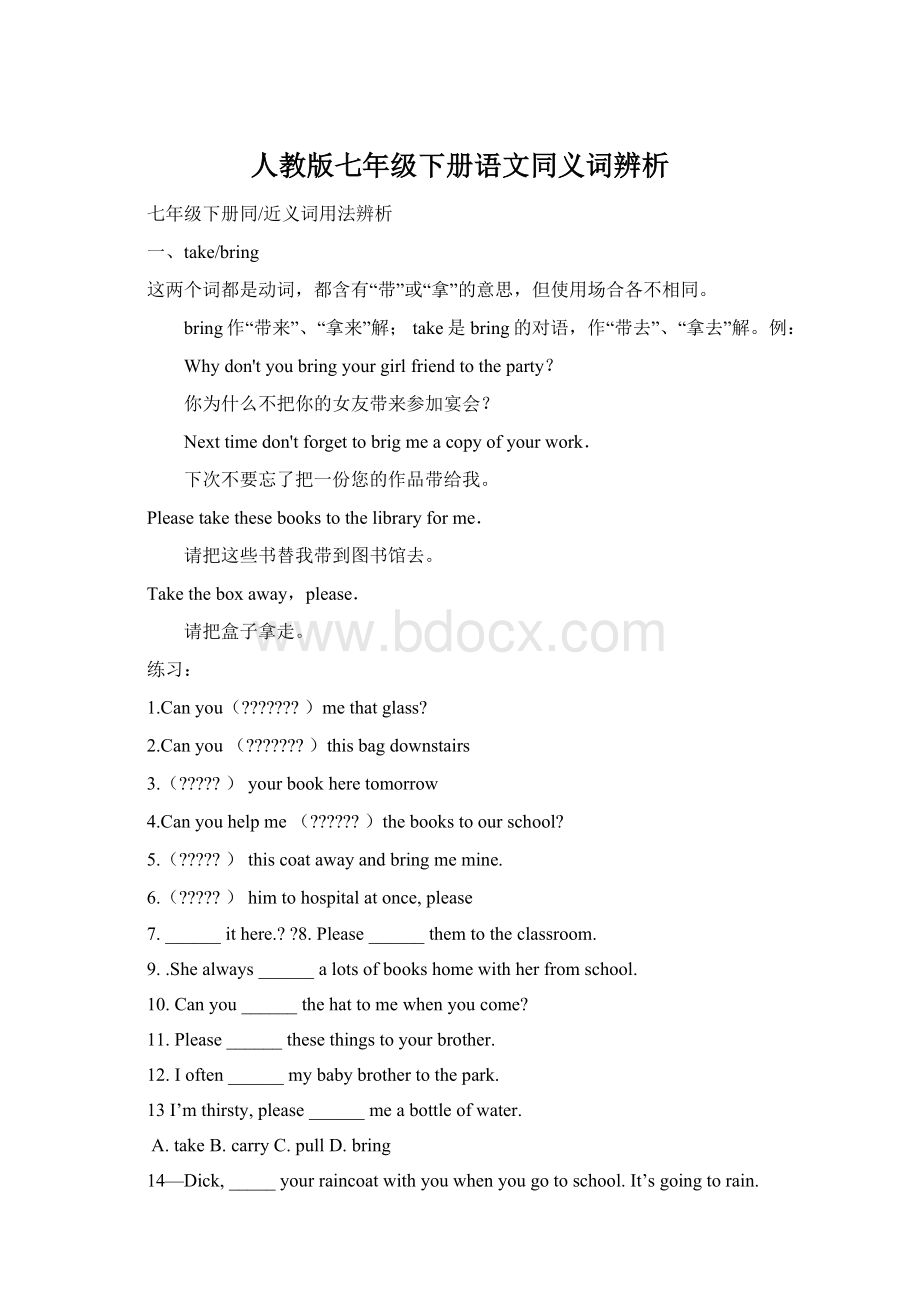人教版七年级下册语文同义词辨析文档格式.docx
《人教版七年级下册语文同义词辨析文档格式.docx》由会员分享,可在线阅读,更多相关《人教版七年级下册语文同义词辨析文档格式.docx(19页珍藏版)》请在冰豆网上搜索。

7.______ithere.?
?
8.Please______themtotheclassroom.
9..Shealways______alotsofbookshomewithherfromschool.
10.Canyou______thehattomewhenyoucome?
11.Please______thesethingstoyourbrother.
12.Ioften______mybabybrothertothepark.
13I’mthirsty,please______meabottleofwater.
A.takeB.carryC.pullD.bring
14—Dick,_____yourraincoatwithyouwhenyougotoschool.It’sgoingtorain.
—OK.Iwill.
A.bringB.takeC.getD.fetch
Keys:
1.bring2.take3.Bring4.take5.Take?
6.Take7.Bring8.take9.bring10.bring11.take12.take13D14.B
二.interesting/interested/interest
interested形容词感到有趣的常用短语是:
a.beinterestedinsth.对某事感兴趣
b.beinterestedindoingsth.对做某事感兴趣 例如:
IaminterestedinEnglish.
我对英语感兴趣.
Heisinterestedinplayingfootball.
他对踢足球感兴趣.
interesting形容词 有趣的 做定语和表语 例如:
1.Thebookisveryinteresting.
这本书很有趣.(表语)
2.Thestorysoundsinteresting.
这个故事听起来很有趣.(表语)
3.Thatisaninterestingfilm.
那是一部有趣的电影.(定语)
interest1.可数名词 兴趣 例如:
Hismaininterestsarereadingandplaying
thepiano.
他主要的兴趣是读书和弹钢琴.
2.短语 placeofinterest名胜古迹
(复数变place)例如:
Heknowsmanyplacesofinterest.
他知道许多名胜古迹.
选词填空interest/interesting/interested
1.Thebookis_________.Mostoftheteachersare_________init.2.3岁的时候他开始对音乐产生了兴趣。
He__________________musicwhenhewas3yearsold.
3Theboyhasmuch_________indrawing.
4他们昨天参观了许多北京的名胜。
Theyvisitedmany____________________________inBeijingyesterday.5.Hetoldusan______storyandwe’reall______init.
A.interested;
interesting
B.interesting;
interested
C.interesting;
D.interested;
Keys1.interesting;
interested2.becameinterestedin3.interest4.placesofinterest5.B
三.alot/alotof/lotsof/
1.alot可用作名词性词组。
如:
IcanlearnalotaboutChinesehistory.我可以学到很多有关中国历史方面的知识。
alot也可作副词词组,修饰动词,意思是“十分”、“非常”,相当于verymuch.如:
IlikeChineseactionmoviesalot.我非常喜欢中国的动作片。
2.alotof与lotsof的意思和用法完全相同,都是起形容词作用的词组,后接可数或不可数名词。
相当于many或much。
如:
Therearealotof/lotsoffamousmoviestarsintheUSA.美国有许多著名的电影明星。
3.只要使用alotof,那么在of的后面一定要跟名词或代词,否则句子不完整。
①Youhavegivenme______help.Thanks
______.
A.alot;
alotofB.alotof;
alot
C.lotsof;
lotD.many;
lotsof
②Weneed______foodeveryday.
A.alotB.many
C.lotsofD.lotof
KeysBC
四.sound/soundlike
1.sound的用法:
1)sound作连系动词,意为“听起来”,“听上去(给人以某种印象)”,常接形容词作表语,不接副词。
Yourcoughsoundsbetter.你的咳嗽听起来好些了。
2.soundlike听起来像,后跟名词,介词短语或从句。
Thatsoundslikeagoodidea!
那听起来是个好主意。
1.TheEnglishsong_____verynice.Canyouguesswhoissinging?
A.smellsB.tastesC.sounds
2.—Let’sdrawapictureofthesun.
—Thatsounds_____tome.
A.easyB.easilyC.difficultly
3.Hervoice_____abirdsinging.
AsoundBsoundslikeCsoundlike
KeysCAB
五.too/also/either
1)tooeither用于句子末尾,前面有逗号与句子隔开;
also用于行为动词之前,be动词、助动词、情态动词之后;
2)tooalso用于肯定句,either用于否定句;
Iamastudent,too.=Iamalsoastudent.我也是学生。
Iamnotastudent,either.我也不是学生。
Ihavemanybooks,too.=Ialsohavemanybooks.我也有很多书。
Idon'
thavemanybooks,either.我也没有很多书。
1.用too,also,either填空:
1)I'
llgotoseethefilm,_________.
2)Ifyoudon'
tcomehere,Ishouldn'
t,______.
3)I,________,willhelphim.
4)JackcanspeakChinese,andhisbrothercan____speakChinese
2.我每天早晨都做运动。
他也是。
(四种形式)
Iplaysportseverymorning.
①Heplayssportseverymorning________.
②Heplayssportseverymorning,________.
③He________playssportseverymorning.
④________________he.
1.too;
either;
also;
also2.①aswell②too③also④Sodoes
六.tell/talk/say/speak
1.speak强调单方的“说”或“讲”并且强调的是说的动作,一般用作不及物动词,要表示“对某人说(某事)”,可用speakto/withsb(aboutsth)。
后面可跟某种语言。
SpeakEnglishinmyclass,please.在我的课上请说英语。
Pleasespeakmoreslowly.请说慢一点。
Ispoketo/withthechairmanaboutmyidea.我跟主席说了我的想法。
2.talk强调双方“交谈”,一般用作不及物动词,表示“同某人谈论(某事)”,可用talkto/withsb(aboutsth)。
Hewastalkingto/withafriend.他在同一位朋友谈话。
Whataretheytalkingabout?
他们在谈论什么?
3.say强调说话内容,一般用作及物动词。
表示“对某人说”,可用saytosb。
Didyousayanything(tohim)?
你(对他)说了些什么?
Hesaid(that)hewantedtogo.他说他想去。
注:
以下句型值得注意:
据说他病了。
正:
Itissaidthatheisill.正:
Heissaidtobeill.4.tell表示“告诉”,可tellsbsth./tellsthtosb.告诉某人某事。
tellsbsth./tellsthtosb.Itoldhimmyname.我把名字告诉了他。
Hetoldhisparentsthegoodnews./Hetoldthegoodnewstohisparents.他把这个好消息告诉了他父母。
还可接不定式的复合结构作宾语,tellsbtodosth叫某人做某事。
Tellhertocomeatonce.叫她马上来。
Hetoldthechildrennottoplayinthestreet.他叫孩子们不要在街上玩。
用say,speak,tell或talk填空。
1.Theteacher_____thestudentsnottobelateagain.
2.Doyouoften_______toyourfriendsonthephone?
3.Don’tforgetto________“Thankyou”whensomeoneopensthedoorforyou.
4.Canyou__________Japanese?
5.OurEnglishteachercomesfromAmerica,butsheoften_______wecan_______Chinesewhenwe_________withher.Sometimesshe________usstoriesinChinese.
6—Theradio______thattherewillbeanotherheavyraininGuangdong.
—Toobad.Ithasrainedforthewholeweek.
A.tellsB.talksC.saysD.Speaks
7.Heisaveryhonestman.Henever______lies.
A.saysB.speaksC.tellsD.talks
Keys:
1.tells2.talk3.say4.speak5.says;
speak;
talk;
tells6.C7.C
七.listen/hear
hear通常表示某种声音“进入我们的耳朵”
2.listen(to)用来表示注意正在持续发出的声音。
这个词强调集中注意力,想尽量听清楚。
你即使不想听,也能hear某个声音。
但你只能有意识地listento某个声音。
3.listen(to)主要是用来表示正在听。
如果要表示从头到尾听完一次演出、演说、音乐节目、广播等,一般要用hear。
1.Youmust_______yourteachercarefullyinclass.
A.listenB.hear
C.listentoD.hearto
2.Don'
t
shout.Ican(
)youclearly.
A.listen
B.listento
C.hear
D.hearof
3.I_____,butI_____nothing.
A.hear,listenB.heard,listenedC.listen,hearD.listened,heard
4.用.listen
/listento
/hear的适当形式填空
.She'
s________theradio.
.Eachnightafterdinnerwelike_____thenews.
.Childrenshould________theirparents.
.I_____himsayso.
.Ican______someoneknocking.
.I_______thathewasill.
1C2C3D4
listeningto
tolistento
listento
heard
hear
heard
八.Job/work
都做名词时,有一些区别
*work工作,多指生产或完成某物的体力的或脑力的努力或活动,不可数。
*job工作,任务,多指为换取报酬而进行的日常活动,尤指作为某人的手艺、行业或职业的工作。
可数
Washingthewindowsisnotmyjob.
洗窗子不是我的事儿(任务)。
1.首先,我们不能说awork,只能说ajob.
2.job的工作可以是\"
零工\"
(如apart-timejob钟点工),但work却多指(全日制)的职业
3.work还可做动词,job只能做名词。
—What’syourfather’s_______?
—Heisaworker.
A.jobB.jobsC.workD.works
九across/through/cross
1.across是介词,有“横跨,横穿,穿越”之意。
例如,TheGreatGreenWallisacrossthenorthwestofChina.绿色长城横跨中国西北。
across与go/walk等动词连用表示“穿过,越过,横穿”的意思。
与cross基本同义,也是表示从物体表面经过。
例如,Goacrosstheroad,youwillfindthepostofficeonyourleft.横过这条公路,你会发现邮局就在你的左边。
2.through是介词,“在...之中,透过”的意思,常与go,walk等动词连用,表示“穿越,横穿”等意思。
主要表示从物体内部穿过。
如穿过森林、隧洞等。
例如,Thetwofriendswerewalkingthroughtheforest.这两个朋友正沿着森林走。
Thesunlightcomesthroughtheglass.阳光透过玻璃。
3.cross作动词用,“穿过,越过”的意思。
主要表示在物体表面上横穿。
如横过马路、过桥、过河等,与goacross同义。
例如,Becarefulwhenyoucrossthestreet.过马路时要小心。
Cross(Goacross)thebridge,andyouwillseeabigbuiding.过这座桥你就会看到一栋大楼。
1.Wemust________theroadverycarefully.
2.Beforegoing_________theroad,youshouldlookleftfirstandthenright.
3.Look!
Themanisswimming_______thelake.
4.Theydrove_______thestreetquickly,butthepolicecaughtthematlast.
5.________thestreetandyoucangettothehotel.
6.He_________theroadandthencomestothepostoffice.
7.Walk_______thefootbridge.
8.Go_________thebridgeandyouwillseethestation.
9.Youcan’t_______theroadwhenthelightisred.
10.It’sdangeroustoswim________theriver.
11.Shewalks_______theroad.
12.Canyouswim_______theriver?
13Thepoliceledtheoldman________thestreet.
14.Wewalked_________theforest.
15.Canthetablego________thedoor?
16.Thestreamwinds_________thevillage.
17.Itrytogetintotheroom________thewindowbecauseIcan’topenthedoor.
18.Thetigerisjumping_______theburningring.
19.Shallwewalk________thefield?
20—Look!
Ablindmanisinthemiddleofthestreet.It’stoodangerous.
—Let’shelphimgo_______thestreet.
A.crossB.throughC.acrossD.along
21Havealookbeforegoingacrossthebusystreet.(改为同义句)
Havealookbefore_______thebusystreet.
Keys:
1.cross2.across3.across4.across5.Cross6.crosses7.across8.across9.cross10.across11.across12.across13.across14.through15.through
十.Wear/puton/dress/dressup/bein
puton(强调穿的动作)穿上,戴上;
Heputonhishatandwentoutoftheofficewithoutaword.
他戴上帽子,一言未发走出了办公室。
wear(强调状态)穿着;
戴着;
佩着
hewaswearingadarksuit.
他穿着深色套装。
bein强调状态(多指颜色等)
Thelittlegirlisinred?
那个小女孩穿着红色的衣服。
dressV.穿衣,更衣:
Grahamshoweredanddressedquickly.格雷厄姆快速地淋浴换衣。
dressoneself给自己穿
Todressoneselfwarmly.使自己穿暖和
bedressd(强调状态),穿着
.Bedressedsoastoattractattentionandadmiration,穿著引人注目
dressup穿着正式,盛装
TheyalldresseduptotakepartintheNewYear'
sparty.
他们都穿上盛装,去参加除夕晚会。
根据句意,用